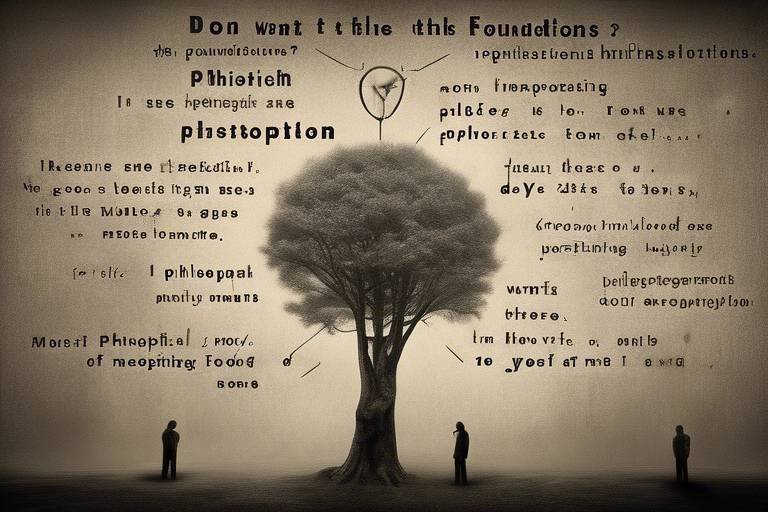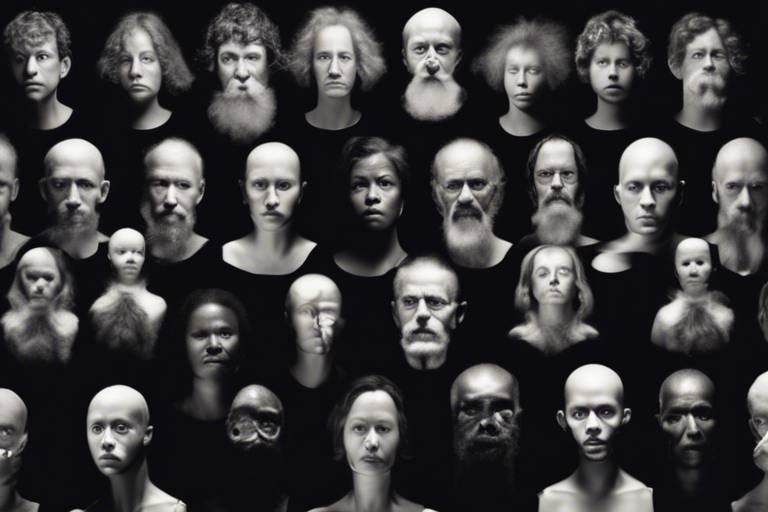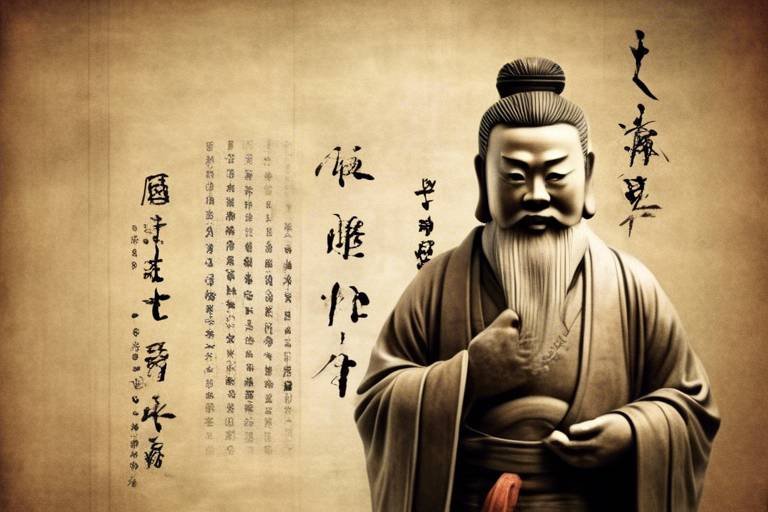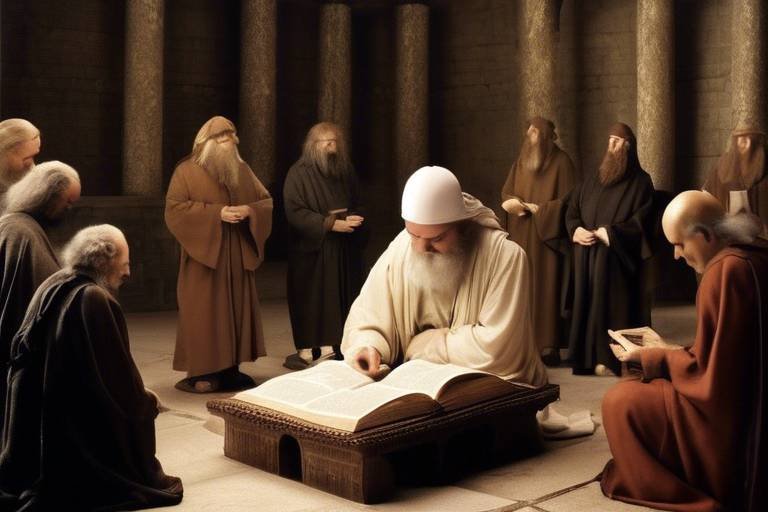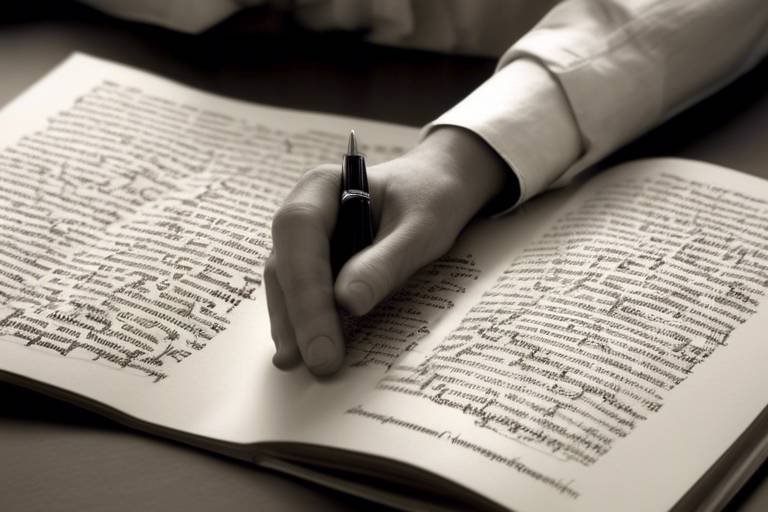The Role of Doubt in Philosophy
Doubt is not just a fleeting feeling or an occasional thought; it is the very foundation upon which philosophical inquiry is built. Imagine stepping into a vast, uncharted territory where every path you take is shrouded in uncertainty. This is the realm of philosophy, where doubt plays a crucial role in shaping our understanding of existence, knowledge, and morality. It sparks curiosity and drives us to question the world around us, prompting us to dig deeper into the fabric of reality. Without doubt, philosophy would be a stagnant pond rather than a flowing river of ideas.
Throughout history, philosophers have embraced doubt as a necessary tool for critical thinking. It serves as a catalyst for intellectual exploration, pushing us beyond the surface of accepted truths. When we doubt, we challenge the status quo, prompting a re-evaluation of beliefs and principles that may have gone unexamined. Think of doubt as a magnifying glass that reveals the cracks in our understanding, urging us to investigate further and seek clarity. This process of questioning leads to profound insights and, ultimately, to a richer understanding of ourselves and the universe.
Moreover, doubt is not merely an obstacle to overcome; it is an essential part of the philosophical journey. It encourages us to embrace uncertainty and complexity, recognizing that life is rarely black and white. In this sense, doubt becomes a companion on our quest for knowledge, guiding us through the labyrinth of ideas and perspectives. As we navigate this intricate landscape, we learn that certainty can be misleading, and that sometimes, the most valuable insights arise from moments of uncertainty.
In modern philosophy, the role of doubt has expanded even further. It has influenced various movements, from existentialism to postmodernism, each of which recognizes the importance of questioning established norms and beliefs. By embracing doubt, these philosophical traditions highlight the fluidity of truth and the subjective nature of human experience. This shift in perspective opens the door to a multitude of interpretations and understandings, enriching our philosophical discourse.
Ultimately, the role of doubt in philosophy is akin to the role of a compass for an explorer. It helps us navigate the vast and often tumultuous seas of thought, guiding us toward new horizons of understanding. So, the next time you find yourself grappling with uncertainty, remember that doubt is not your enemy; it is a powerful ally in the pursuit of wisdom. Embrace it, question everything, and allow it to lead you to deeper insights and greater clarity.
- Why is doubt important in philosophy? Doubt encourages critical thinking and helps challenge accepted beliefs, leading to deeper understanding.
- How has doubt influenced historical philosophical movements? Doubt has shaped various movements, from skepticism to existentialism, prompting philosophers to question the nature of knowledge and truth.
- Can doubt be beneficial in everyday life? Yes, embracing doubt can lead to personal growth by encouraging individuals to question norms and seek their own truths.

The Historical Context of Doubt
To fully grasp the significance of doubt in philosophy, it’s essential to explore its historical evolution. Doubt has not always been viewed as a mere obstacle to knowledge; rather, it has been embraced as a powerful tool for inquiry. From the ancient skeptics who questioned the very nature of truth to modern existentialists who grapple with the meaning of existence, doubt has shaped philosophical discourse in profound ways.
In ancient Greece, philosophers like Socrates employed doubt as a method of inquiry, famously asking probing questions that revealed the ignorance of those who claimed to know. This Socratic method laid the groundwork for critical thinking, emphasizing that questioning is a vital part of gaining knowledge. As we move through history, we encounter the Academics who, influenced by Socratic skepticism, argued that certainty is unattainable. They posited that knowledge is always provisional, urging a continuous pursuit of understanding.
The Middle Ages saw a shift in the perception of doubt, particularly with the rise of scholasticism. Thinkers like Thomas Aquinas sought to reconcile faith and reason, often using doubt to challenge and refine theological arguments. This period highlighted how doubt could coexist with belief, leading to a more nuanced understanding of both faith and reason. However, as the Renaissance emerged, the emphasis on humanism shifted the focus back to individual reasoning, again placing doubt at the forefront of philosophical inquiry.
Fast forward to the 17th century, where we find René Descartes revolutionizing the concept of doubt. His methodical doubt became a systematic approach to dismantling preconceived notions and establishing a foundation for knowledge. Descartes famously stated, “I think, therefore I am,” encapsulating the idea that the very act of doubting confirms one's existence. This pivotal moment in Western philosophy marked a significant turn in embracing doubt as a means to attain certainty.
As we delve into the 18th and 19th centuries, philosophers like David Hume and the existentialists further expanded the role of doubt. Hume's skepticism about causation and the limits of human understanding prompted a reevaluation of the nature of knowledge itself. Meanwhile, existentialists argued that doubt is crucial for personal authenticity, suggesting that questioning societal norms and values leads to a more genuine existence.
In summary, the historical context of doubt reveals its transformative power in philosophical thought. It has evolved from a mere obstacle to knowledge into a fundamental element that drives inquiry and fosters critical thinking. Understanding this evolution not only enriches our appreciation for philosophical traditions but also highlights the importance of doubt in our own quest for understanding.
- What is the significance of doubt in philosophy? Doubt serves as a catalyst for inquiry, prompting deeper questioning and analysis of knowledge and beliefs.
- How did ancient philosophers view doubt? Ancient philosophers, particularly Socrates, viewed doubt as a method for uncovering ignorance and fostering critical thinking.
- What role did Descartes play in the evolution of doubt? Descartes introduced methodical doubt as a systematic approach to establish a foundation for knowledge, significantly influencing modern philosophy.
- How does doubt relate to ethics? In ethical philosophy, doubt challenges absolute moral truths, encouraging a more nuanced understanding of morality.

Skepticism and Its Philosophical Impact
Skepticism, at its core, is a profound philosophical approach that questions the very foundations of knowledge and certainty. It acts as a lens through which we can examine our beliefs, urging us to probe deeper into the nature of what we claim to know. This relentless questioning has shaped the trajectory of philosophical discourse, influencing a myriad of thinkers and movements throughout history. From ancient skeptics who doubted the reliability of the senses to modern philosophers challenging the concept of objective truth, skepticism serves as a crucial catalyst for intellectual exploration.
One of the most significant impacts of skepticism is its ability to foster a culture of inquiry and critical thinking. By challenging accepted norms and beliefs, skepticism encourages individuals to engage in rigorous analysis and reflection. This is particularly evident in the works of philosophers like René Descartes and David Hume, who utilized skepticism to explore the limits of human understanding. Their inquiries not only questioned the validity of knowledge claims but also laid the groundwork for subsequent philosophical debates.
For instance, Descartes famously employed a methodical approach to doubt, systematically questioning every belief until he reached an undeniable truth. This approach not only established a foundation for modern philosophy but also ignited a movement that emphasized the importance of doubt in the pursuit of knowledge. On the other hand, Hume's skepticism about causation and induction prompted further discussions about the nature of evidence and belief, challenging the very principles that underpin scientific inquiry.
The influence of skepticism extends beyond individual thinkers; it has permeated various philosophical movements, creating a rich tapestry of ideas. To illustrate this, consider the following key philosophical movements influenced by skepticism:
| Philosophical Movement | Key Concepts | Influential Thinkers |
|---|---|---|
| Empiricism | Knowledge through sensory experience | John Locke, David Hume |
| Existentialism | Questioning existence and meaning | Søren Kierkegaard, Jean-Paul Sartre |
| Postmodernism | Relativism and deconstruction of narratives | Michel Foucault, Jacques Derrida |
As we can see, skepticism isn't just a solitary philosophical stance; it's a dynamic force that has shaped various schools of thought, each contributing unique insights into the human experience. By questioning the validity of knowledge, skepticism invites us to explore the complexities of perception, belief, and reality.
Moreover, skepticism plays a critical role in contemporary discussions about truth and knowledge. In an age where information is abundant yet often misleading, the ability to doubt and critically assess claims is more important than ever. Skepticism empowers us to navigate the murky waters of misinformation and biases, fostering a more informed and thoughtful society.
In essence, skepticism acts as a philosophical compass, guiding us through the uncertainties of existence. It encourages us to embrace doubt not as a weakness, but as a strength—a tool for intellectual growth and personal development. By questioning our assumptions and beliefs, we can cultivate a deeper understanding of ourselves and the world around us.

Descartes and Methodical Doubt
René Descartes, often hailed as the father of modern philosophy, introduced a revolutionary approach to knowledge through what he termed methodical doubt. This technique was not merely about skepticism for skepticism's sake; rather, it was a systematic process aimed at stripping away all beliefs that could be doubted, no matter how seemingly solid. Imagine standing on a shaky bridge, questioning its stability—this is akin to Descartes' philosophical approach. By doubting everything, he sought to uncover what, if anything, could be known with absolute certainty.
Descartes' journey into doubt led him to the realization that while he could doubt the existence of the physical world, he could not doubt his own existence as a thinking being. This profound insight is encapsulated in his famous declaration, “Cogito, ergo sum”, which translates to “I think, therefore I am.” This statement became a cornerstone of Western philosophy, emphasizing that the very act of doubt confirms the existence of the self. It’s like a light bulb flicking on in a dark room; even in darkness, the flicker of thought illuminates the essence of being.
However, Descartes’ methodical doubt was not without its critiques. Some philosophers argued that his reliance on doubt could lead to a slippery slope of absolute skepticism. If everything can be doubted, then how can we establish any firm foundation for knowledge? Critics pointed out that this approach could undermine the very essence of what it means to know something. In essence, Descartes was walking a tightrope, balancing the need for certainty with the inherent uncertainties of human perception.
Despite these critiques, Descartes' influence is undeniable. His methodical doubt laid the groundwork for subsequent philosophical inquiry, prompting thinkers like David Hume to further explore the limits of human understanding. Hume, for instance, took Descartes’ skepticism and ran with it, questioning the very nature of causality and experience. This interplay of doubt and knowledge continues to shape philosophical discourse today, inviting us to ponder: What do we truly know?
In conclusion, Descartes’ methodical doubt is not just a historical footnote; it is a vital tool that encourages us to question our beliefs and assumptions. By embracing doubt, we open ourselves to deeper understanding and intellectual growth. It’s a reminder that in the quest for knowledge, it’s perfectly acceptable to pause, reflect, and wonder about the very foundations of our understanding.
- What is methodical doubt? Methodical doubt is a systematic approach introduced by Descartes that involves doubting all beliefs to establish a foundation for true knowledge.
- Why is "Cogito, ergo sum" significant? This phrase highlights the idea that the act of thinking is proof of one's existence, serving as a fundamental principle in Western philosophy.
- What are the critiques of Descartes' approach? Critics argue that absolute skepticism can undermine the foundation of knowledge, leading to uncertainty in understanding reality.
- How did Descartes influence modern philosophy? His methodical doubt prompted later philosophers, such as Hume, to explore the limits of human understanding and the nature of knowledge.

Cogito, Ergo Sum
The phrase , which translates to "I think, therefore I am," is not just a catchy slogan; it's a profound declaration that has reverberated through the corridors of philosophy for centuries. This assertion by René Descartes serves as a cornerstone of modern Western philosophy, encapsulating a pivotal moment in the quest for knowledge and self-understanding. At its core, this statement highlights the relationship between thought and existence, suggesting that the very act of doubting or thinking is evidence of one's own being. Imagine standing in front of a mirror, questioning your reflection. The mere act of questioning confirms that you are there, conscious and alive. This is the essence of Descartes' argument.
Descartes introduced methodical doubt as a systematic approach to dismantling all beliefs that could be called into question. By stripping away everything that could be doubted, he aimed to arrive at an indubitable foundation of knowledge. This rigorous process led him to the realization that while he could doubt the existence of the physical world, he could not doubt his own existence as a thinking entity. In other words, if he is capable of doubting, then he must exist to perform that very act of doubt. This realization opened the floodgates for further philosophical inquiry, prompting questions about the nature of reality, consciousness, and the self.
However, Descartes' conclusion was not without its critics. Some philosophers argue that his reliance on doubt as a method can lead to a slippery slope of absolute skepticism, where one questions everything to the point of paralysis. Others contend that while the cogito provides a foundation for individual existence, it does not necessarily extend to the existence of the external world or other minds. This brings us to a crucial philosophical debate: if one can only be certain of their own existence, how can we ascertain the reality of the world around us? Here lies the tension between subjective certainty and objective reality, a theme that continues to resonate in philosophical discussions today.
In the grand tapestry of philosophical thought, stands as a beacon of clarity amidst the fog of uncertainty. It invites us to embrace doubt as a means of understanding ourselves and our place in the world. By acknowledging our capacity for thought, we embark on a journey of exploration and inquiry that challenges us to question our assumptions and beliefs. This journey is not merely academic; it is deeply personal, urging us to confront the fundamental questions of existence, identity, and truth.
- What does "Cogito, ergo sum" mean?
It translates to "I think, therefore I am," indicating that the act of thinking is proof of one's existence. - Who introduced the concept of methodical doubt?
René Descartes introduced methodical doubt as a way to establish a foundation for knowledge. - Why is the cogito significant in philosophy?
The cogito is significant because it highlights the relationship between thought and existence, influencing many philosophical movements. - What are some critiques of Descartes' cogito?
Critics argue that it leads to absolute skepticism and does not provide certainty about the external world or other minds.

Cogito, ergo sum
This article explores how doubt serves as a foundational element in philosophical inquiry, shaping critical thinking and influencing various philosophical movements throughout history.
Understanding the historical evolution of doubt in philosophy provides insight into its significance and application in various philosophical traditions, from ancient skepticism to modern existentialism.
Skepticism, as a philosophical approach, challenges the certainty of knowledge, prompting deeper questioning and analysis in philosophical discourse, influencing thinkers from Descartes to Hume.
René Descartes famously employed methodical doubt as a tool to establish a foundation for knowledge, asserting that doubting everything leads to the undeniable truth of one's own existence.
The phrase , which translates to "I think, therefore I am," encapsulates Descartes' conclusion that the act of doubting confirms the existence of the self as a thinking being. This pivotal moment in Western philosophy marked a radical departure from previous ideas about knowledge and existence. Descartes argued that while all else could be doubted, the very act of doubt itself was proof of one’s existence. In other words, if you are capable of questioning your own existence, then you must exist in some form to do so. This assertion not only laid the groundwork for modern philosophy but also sparked a profound exploration of the nature of consciousness and self-awareness.
To further grasp the significance of , consider the following points:
- Foundation of Knowledge: Descartes sought a solid foundation for knowledge, and this phrase provided a starting point that was indubitable.
- Self-Awareness: The phrase emphasizes the importance of self-awareness in the pursuit of truth.
- Philosophical Inquiry: It opened the door for future philosophical inquiries into the nature of existence and reality.
Despite its revolutionary impact, Descartes' reliance on doubt has faced critiques, particularly concerning the implications of absolute skepticism and its challenges in establishing a concrete foundation for knowledge. Critics argue that while highlights individual existence, it may overlook the interconnectedness of human experience and the role of external realities. Moreover, the leap from doubt to certainty can be seen as problematic, leading to questions about the validity of knowledge derived solely from introspection. This critique invites further exploration into the nature of doubt and its implications in a broader philosophical context.
In contemporary philosophy, doubt continues to play a critical role, influencing existentialist thought and postmodern critiques of objective truth and certainty.
Doubt in ethical philosophy prompts critical examination of moral principles, challenging absolute moral truths and encouraging a more nuanced understanding of ethical dilemmas.
Moral relativism embraces doubt by suggesting that ethical truths are not universal, leading to diverse interpretations of morality based on cultural and individual perspectives.
Existentialist philosophers emphasize the importance of doubt in achieving authenticity, arguing that questioning societal norms leads to a more genuine existence.
In conclusion, doubt serves as a vital catalyst for philosophical exploration, encouraging critical thinking and fostering deeper understanding across various philosophical domains. Embracing doubt can lead to personal growth and intellectual enlightenment.
"Cogito, ergo sum" translates to "I think, therefore I am," and signifies that the act of thinking is proof of one's existence.
Descartes utilized methodical doubt to strip away all beliefs that could be questioned, ultimately arriving at the certainty of his own existence as a thinking being.
Doubt is crucial in philosophy as it encourages critical examination of beliefs, promotes deeper inquiry, and challenges assumptions, leading to greater understanding and knowledge.

encapsulates Descartes' conclusion that the act of doubting confirms the existence of the self as a thinking being, a pivotal moment in Western philosophy.
This article explores how doubt serves as a foundational element in philosophical inquiry, shaping critical thinking and influencing various philosophical movements throughout history.
Understanding the historical evolution of doubt in philosophy provides insight into its significance and application in various philosophical traditions, from ancient skepticism to modern existentialism.
Skepticism, as a philosophical approach, challenges the certainty of knowledge, prompting deeper questioning and analysis in philosophical discourse, influencing thinkers from Descartes to Hume.
René Descartes famously employed methodical doubt as a tool to establish a foundation for knowledge, asserting that doubting everything leads to the undeniable truth of one's own existence.
The phrase Cogito, ergo sum encapsulates Descartes' conclusion that the act of doubting confirms the existence of the self as a thinking being, a pivotal moment in Western philosophy. This assertion is not just a philosophical statement; it's a profound realization that challenges the very fabric of what we consider knowledge. By doubting everything we perceive and believe, we arrive at a fundamental truth: the very act of doubt implies a thinker. In other words, if you are questioning your existence, you must exist to question it. This self-awareness is what distinguishes humans as rational beings and lays the groundwork for modern philosophy.
Descartes' reliance on doubt has faced critiques, particularly concerning the implications of absolute skepticism and its challenges in establishing a concrete foundation for knowledge.
In contemporary philosophy, doubt continues to play a critical role, influencing existentialist thought and postmodern critiques of objective truth and certainty.
Doubt in ethical philosophy prompts critical examination of moral principles, challenging absolute moral truths and encouraging a more nuanced understanding of ethical dilemmas.
Moral relativism embraces doubt by suggesting that ethical truths are not universal, leading to diverse interpretations of morality based on cultural and individual perspectives.
Existentialist philosophers emphasize the importance of doubt in achieving authenticity, arguing that questioning societal norms leads to a more genuine existence.
In conclusion, doubt serves as a vital catalyst for philosophical exploration, encouraging critical thinking and fostering deeper understanding across various philosophical domains. Embracing doubt can lead to personal growth and intellectual enlightenment.
- What is the significance of doubt in philosophy? Doubt encourages critical thinking and challenges established beliefs, leading to deeper understanding and exploration of philosophical concepts.
- How did Descartes use doubt in his philosophy? Descartes employed methodical doubt to strip away uncertain beliefs, ultimately arriving at the foundational truth of his own existence.
- What are some critiques of Descartes' approach to doubt? Critics argue that absolute skepticism can lead to a paradox where no knowledge can be established, questioning the practicality of Descartes' conclusions.
- How does doubt influence modern ethical discussions? Doubt encourages the examination of moral principles, leading to a recognition of moral relativism and the complexity of ethical dilemmas.

Critiques of Descartes
René Descartes, often hailed as the father of modern philosophy, introduced the concept of methodical doubt as a means to achieve certainty in knowledge. However, his approach has not been without its critics. One of the primary critiques revolves around the implications of his radical skepticism. By doubting everything, including the existence of the external world, Descartes risks falling into an abyss of absolute skepticism, where no knowledge can be deemed reliable. This raises the question: if we can doubt everything, can we ever truly know anything?
Moreover, critics argue that Descartes' reliance on doubt as a foundational tool may lead to an unbridgeable gap between thought and reality. For instance, philosopher David Hume challenged the notion of causality that Descartes relied upon, suggesting that our understanding of cause and effect is based on habit rather than rational certainty. Hume posited that just because we observe events occurring in succession, it does not necessarily mean that one causes the other. This critique opens up a broader discussion about the limitations of human reason and the subjective nature of experience.
Another significant critique comes from the existentialist perspective, which emphasizes the importance of lived experience over abstract reasoning. Existentialist thinkers like Søren Kierkegaard argue that Descartes' methodical doubt neglects the emotional and existential dimensions of human life. They contend that while doubt can lead to intellectual clarity, it can also result in paralysis, where individuals become so consumed by uncertainty that they fail to act. This perspective highlights a critical tension in philosophy: the balance between skepticism and the need for decisive action in the face of doubt.
Furthermore, the feminist critique of Descartes adds another layer to this discussion. Feminist philosophers argue that Descartes' emphasis on the solitary thinking subject ignores the relational aspects of knowledge and existence. By prioritizing individual reason, he inadvertently marginalizes the experiences and voices of those who do not fit the mold of the 'rational man.' This critique invites us to reconsider the foundations of knowledge and the importance of diverse perspectives in the pursuit of truth.
In summary, while Descartes' methodical doubt was revolutionary in its time, it has sparked a myriad of critiques that challenge its efficacy and implications. From concerns about absolute skepticism to the existential and feminist critiques, these discussions continue to shape philosophical discourse today. They remind us that doubt, while essential, must be balanced with other ways of knowing and being in the world.
- What is methodical doubt?
Methodical doubt is a systematic process of being skeptical about the truth of one's beliefs, famously employed by René Descartes to establish a foundation for knowledge.
- Why is Descartes considered the father of modern philosophy?
Descartes is considered the father of modern philosophy due to his emphasis on reason as the primary source of knowledge and his methodical approach to philosophical inquiry.
- What are some critiques of Descartes' philosophy?
Critiques include concerns about absolute skepticism, the neglect of lived experience, and the exclusion of diverse perspectives in the pursuit of knowledge.
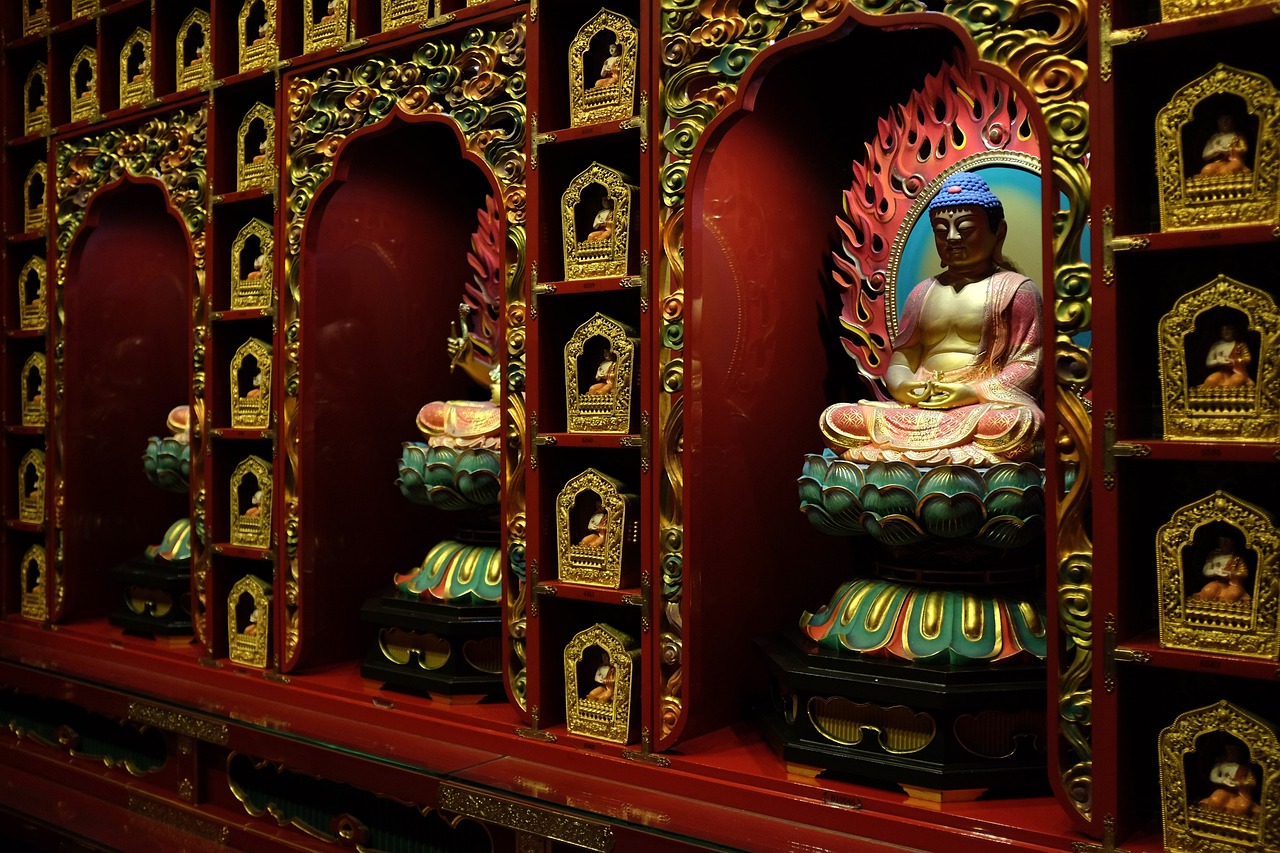
Modern Philosophical Doubt
In the realm of contemporary philosophy, doubt emerges as a powerful force that shapes our understanding of reality, knowledge, and existence. Unlike the rigid skepticism of the past, modern philosophical doubt is more fluid, embracing complexity and ambiguity. It invites us to question not just what we know, but how we know it. This shift has significant implications for various philosophical movements, particularly existentialism and postmodernism, which challenge the very foundations of objective truth and certainty.
Existentialist thinkers, such as Jean-Paul Sartre and Simone de Beauvoir, argue that doubt is essential for achieving authenticity in our lives. They posit that when individuals confront the uncertainties of existence, they are compelled to make choices that reflect their true selves, rather than conforming to societal expectations. This process of questioning and self-examination leads to a more genuine existence, as it encourages individuals to grapple with their own beliefs and values rather than passively accepting them. In this sense, doubt becomes a catalyst for personal growth and self-discovery.
On the other hand, postmodern philosophy takes a different approach to doubt. Thinkers like Michel Foucault and Jacques Derrida argue that the very concept of truth is constructed through language, culture, and power dynamics. They assert that what we consider to be knowledge is often a reflection of societal norms and historical contexts, rather than an objective reality. This perspective fosters a critical examination of accepted truths, encouraging us to recognize the limitations of our understanding and the biases inherent in our perspectives.
In both existentialism and postmodernism, doubt serves as a bridge to deeper inquiry. It pushes us to ask challenging questions about our beliefs, urging us to consider the following:
- What is the nature of reality?
- How do our experiences shape our understanding of truth?
- Can we ever truly know anything with absolute certainty?
Moreover, modern philosophical doubt is not just an academic exercise; it has real-world implications. In an age of information overload, where fake news and misinformation abound, cultivating a healthy skepticism is crucial. By questioning sources and seeking evidence, individuals can navigate the complexities of contemporary society more effectively. Thus, modern philosophical doubt serves as both a theoretical framework and a practical tool for engaging with the world around us.
In summary, modern philosophical doubt is a dynamic force that encourages critical thinking and self-reflection. It challenges us to confront the uncertainties of existence and the constructed nature of truth, ultimately leading to a richer understanding of ourselves and the world we inhabit. As we embrace doubt, we open ourselves to new possibilities and deeper insights, making it an invaluable aspect of philosophical inquiry today.
- What is the significance of doubt in philosophy? Doubt encourages critical thinking, challenges accepted truths, and fosters personal growth.
- How does modern philosophical doubt differ from historical skepticism? Modern doubt is more fluid and embraces complexity, while historical skepticism often adhered to rigid frameworks.
- Can doubt lead to personal growth? Yes, by questioning beliefs and societal norms, individuals can achieve greater authenticity and self-discovery.

The Role of Doubt in Ethical Philosophy
Doubt in ethical philosophy is not just a fleeting thought; it serves as a profound catalyst for questioning and re-evaluating our moral compass. Imagine standing at a crossroads, where every path represents a different ethical principle. The moment you introduce doubt into your decision-making process, you begin to question the validity of these paths. Is one truly better than the other? Are our moral beliefs shaped more by societal norms than by intrinsic truths? This critical examination is essential for developing a nuanced understanding of ethical dilemmas.
One of the most significant contributions of doubt to ethical philosophy is its ability to challenge **absolute moral truths**. When we embrace doubt, we open ourselves to the idea that morality is not a one-size-fits-all concept. Instead, it can be influenced by various factors, including culture, personal experiences, and situational contexts. This leads us to consider **moral relativism**, which posits that ethical truths are subjective rather than universal. For instance, what may be considered morally acceptable in one culture could be viewed as unethical in another. This perspective encourages a broader understanding of morality, allowing for a rich tapestry of ethical interpretations.
Furthermore, existentialist philosophers, such as Jean-Paul Sartre and Simone de Beauvoir, emphasize the importance of doubt in achieving **authenticity**. They argue that questioning societal norms and expectations is crucial for leading a genuine life. When we doubt the values imposed upon us, we create space for personal reflection and growth. This process can be likened to peeling an onion; each layer of doubt reveals deeper insights into our true selves, ultimately leading to a more authentic existence.
To illustrate the impact of doubt in ethical philosophy, consider the following table that outlines how doubt influences various ethical frameworks:
| Ethical Framework | Role of Doubt |
|---|---|
| Utilitarianism | Doubt encourages questioning the consequences of actions, prompting a reassessment of what constitutes the greatest good. |
| Kantian Ethics | Doubt challenges the universality of maxims, leading to discussions on whether certain actions can be deemed morally obligatory. |
| Virtue Ethics | Doubt fosters introspection about personal character traits, encouraging individuals to strive for moral excellence. |
In conclusion, doubt plays a pivotal role in ethical philosophy by prompting critical examination of moral principles. It encourages us to question the absoluteness of our beliefs and to explore the diverse interpretations of morality. By embracing doubt, we not only enhance our understanding of ethical dilemmas but also pave the way for personal growth and a more authentic existence. So, the next time you find yourself grappling with a moral decision, remember that doubt is not a hindrance; it’s a powerful tool that can lead to deeper insights and a more profound understanding of what it means to be ethical.
- What is the significance of doubt in ethical decision-making?
Doubt encourages individuals to critically evaluate their moral beliefs and consider diverse perspectives, leading to more informed and nuanced ethical choices. - How does moral relativism relate to doubt?
Moral relativism suggests that ethical truths are subjective, and doubt plays a crucial role in questioning the absoluteness of moral principles, allowing for various interpretations based on context. - Can doubt enhance personal authenticity?
Yes! By questioning societal norms and expectations, doubt allows individuals to reflect on their values and lead a more genuine life.
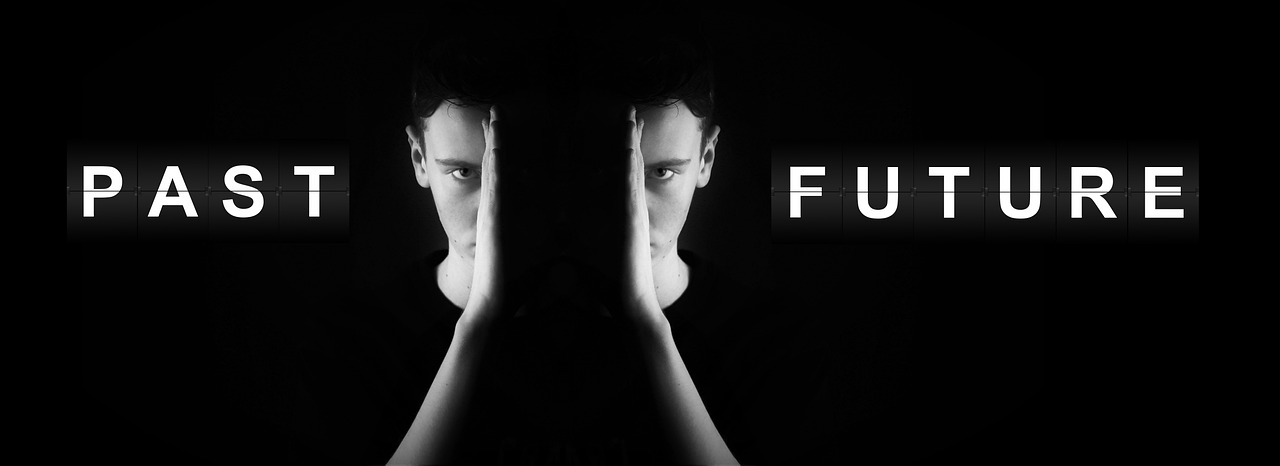
Relativism and Moral Doubt
In the realm of philosophy, moral relativism introduces a fascinating perspective on ethical truths. It suggests that what is considered "right" or "wrong" is not universal but rather shaped by cultural, societal, and individual contexts. This notion inherently invites doubt into our moral frameworks, prompting us to question the absoluteness of our ethical beliefs. Imagine, for a moment, that morality is like a kaleidoscope—each turn reveals a different pattern, influenced by the light and colors around it. This analogy illustrates how diverse interpretations of morality can emerge based on varying backgrounds and experiences.
Moral relativism challenges us to consider several critical questions:
- Are our moral judgments truly objective, or are they influenced by our upbringing and culture?
- How do we reconcile conflicting moral views from different societies?
- Can we establish a common ground for ethical discussions, or are we forever bound by our subjective experiences?
By embracing doubt in our moral reasoning, we open ourselves to a broader understanding of ethical dilemmas. For instance, consider the issue of capital punishment. In some cultures, it is seen as a necessary form of justice, while in others, it is viewed as a violation of human rights. This divergence highlights the moral uncertainty that arises when we confront ethical issues through the lens of relativism. It compels us to engage in meaningful dialogue, allowing for a richer exploration of what constitutes justice and morality.
Furthermore, this doubt fosters a sense of humility in our moral convictions. When we recognize that our beliefs may not hold true in every context, we become more open to understanding others' perspectives. This does not mean we abandon our values; rather, we learn to navigate the complex landscape of morality with a more nuanced approach. In this way, doubt acts as a bridge, connecting diverse viewpoints and enriching our ethical discussions.
Ultimately, moral relativism and the doubt it brings challenge us to think critically about our ethical frameworks. It encourages us to ask tough questions and to remain open to the possibility that our understanding of morality is just one piece of a much larger puzzle. By embracing this uncertainty, we can cultivate a more compassionate and informed approach to ethical dilemmas, fostering dialogue and understanding in an increasingly complex world.
- What is moral relativism? Moral relativism is the belief that moral truths are not absolute but are shaped by cultural, societal, and individual contexts.
- How does doubt play a role in moral relativism? Doubt encourages individuals to question the absoluteness of their moral beliefs, leading to a more nuanced understanding of ethical issues.
- Can moral relativism lead to moral chaos? While some argue it may lead to confusion, others believe it fosters dialogue and understanding among differing moral perspectives.
- Is it possible to find common ground in moral discussions? Yes, by acknowledging our differences and engaging in open dialogue, we can find shared values that transcend cultural boundaries.
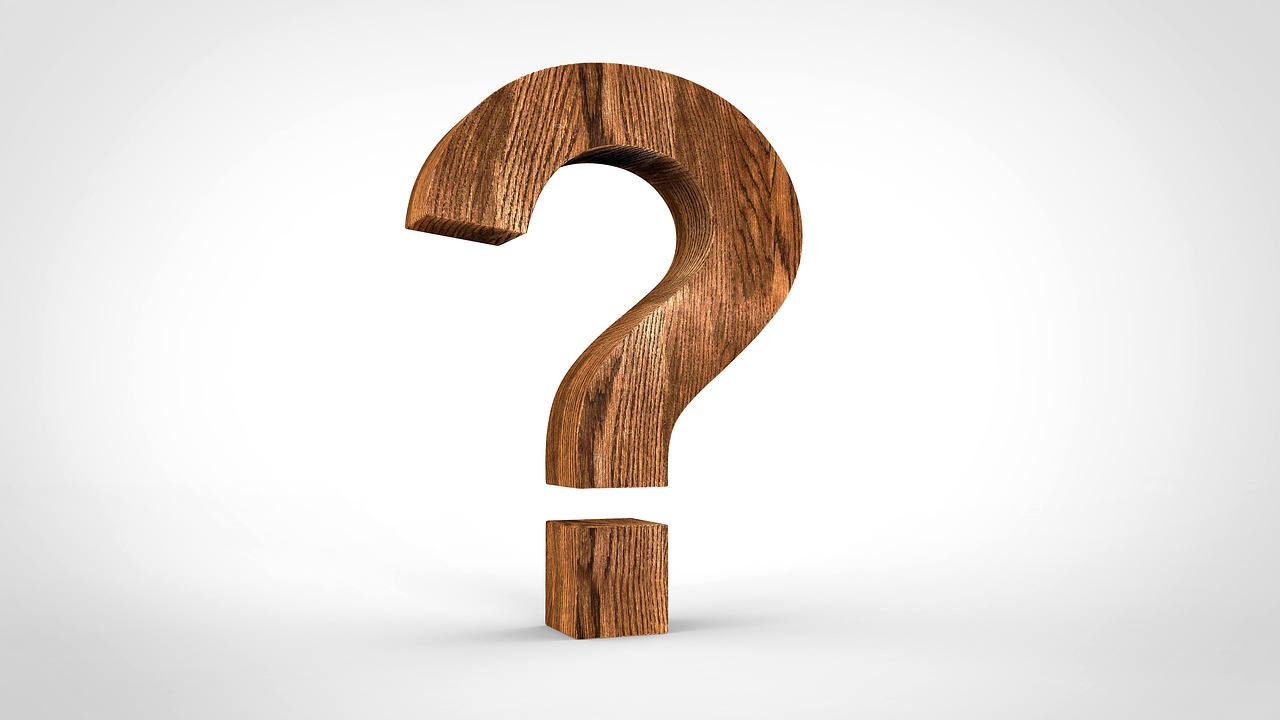
Existential Doubt and Authenticity
Existential doubt is one of those fascinating concepts that can feel like a double-edged sword. On one hand, it can lead us into a labyrinth of uncertainty, where every belief and value we hold is questioned. On the other hand, it serves as a powerful catalyst for achieving authenticity in our lives. Imagine standing at a crossroads, where each path represents a different choice you've made based on societal norms or expectations. The moment you start to doubt those choices is the moment you begin to uncover your true self.
Existentialist philosophers, such as Jean-Paul Sartre and Søren Kierkegaard, argue that doubt is not merely a hurdle to overcome but a necessary step toward genuine existence. They suggest that when we question the status quo, we peel back the layers of conformity that often shroud our identities. This process of questioning can be uncomfortable, akin to shedding an old skin, but it ultimately leads to a more profound understanding of who we are and what we truly value.
Consider this: how often do we accept beliefs without questioning them? Whether it's societal norms, religious doctrines, or even personal convictions, many of us live on autopilot. This is where existential doubt comes into play. It nudges us to ask the tough questions:
- What do I really believe?
- Am I living according to my own values or those imposed by others?
- What does it mean to live authentically?
By grappling with these inquiries, we begin to forge our own paths, separate from the expectations of our families, communities, or cultures. This journey towards authenticity can be liberating; it allows us to embrace our individuality and live a life that resonates with our true selves. But, it also requires courage. The fear of social rejection or the discomfort of confronting our own insecurities can make the journey daunting.
Moreover, existential doubt encourages us to take responsibility for our choices. When we start to question everything, we realize that we are not just passive recipients of life’s experiences but active participants. This realization can be empowering. It pushes us to make choices that align with our authentic selves, rather than simply following the crowd. The path to authenticity is fraught with challenges, but it is also filled with opportunities for personal growth and self-discovery.
In conclusion, existential doubt is not just a philosophical concept; it is a vital part of the human experience. It invites us to challenge our beliefs, embrace our individuality, and live authentically. By welcoming doubt into our lives, we open the door to a richer, more meaningful existence, one that is uniquely our own.
- What is existential doubt? Existential doubt refers to the questioning of one's beliefs, values, and the very essence of existence, often leading to a deeper understanding of oneself.
- How does doubt contribute to authenticity? By questioning societal norms and personal beliefs, doubt encourages individuals to explore their true values, leading to a more authentic life.
- Can doubt be harmful? While doubt can lead to anxiety and uncertainty, it can also be a powerful tool for personal growth and self-discovery when approached constructively.
- What are some famous existentialist philosophers? Notable existentialist philosophers include Jean-Paul Sartre, Søren Kierkegaard, and Friedrich Nietzsche, each of whom explored the complexities of doubt and authenticity.

Conclusion: Embracing Doubt in Philosophy
In the grand tapestry of philosophical inquiry, doubt emerges not as an adversary but as a powerful ally. It serves as a vital catalyst for exploration, urging us to question the very foundations of our beliefs and assumptions. By embracing doubt, we open ourselves to a realm of possibilities where critical thinking flourishes and intellectual growth becomes inevitable. This journey through uncertainty can be likened to navigating a dense fog; while visibility may be limited, the path ahead is rich with potential discoveries.
Throughout history, philosophers have recognized the transformative power of doubt. From the ancient skeptics who challenged the status quo to modern existentialists advocating for authenticity, doubt has played a crucial role in shaping our understanding of knowledge, ethics, and existence itself. It invites us to peel back the layers of certainty and confront the complexities that lie beneath. This process not only enriches our philosophical discourse but also enhances our personal growth.
Moreover, the willingness to embrace doubt encourages a more nuanced perspective on ethical dilemmas. In a world rife with moral ambiguity, questioning absolute truths allows for a broader appreciation of diverse viewpoints. This relativistic approach fosters empathy and understanding, reminding us that our experiences are but one thread in the intricate fabric of human existence.
As we reflect on the role of doubt in philosophy, it's essential to acknowledge its potential for fostering intellectual enlightenment. By daring to question, we cultivate a mindset that is open to new ideas and perspectives. This openness not only enriches our philosophical journey but also empowers us to engage with the world around us in a more meaningful way. So, let's embrace doubt as a guiding force in our quest for knowledge and understanding, for it is through this embrace that we truly begin to unravel the mysteries of existence.
- What is the significance of doubt in philosophy?
Doubt prompts critical examination of beliefs, leading to deeper understanding and exploration of various philosophical concepts. - How has skepticism influenced modern philosophy?
Skepticism challenges the certainty of knowledge, encouraging thinkers to analyze and question established truths. - Can doubt lead to personal growth?
Yes, embracing doubt can foster intellectual enlightenment and personal development by encouraging open-mindedness and critical thinking. - What role does doubt play in ethical philosophy?
Doubt in ethics challenges absolute moral truths, promoting a more nuanced understanding of moral dilemmas and encouraging diverse interpretations of morality.
Frequently Asked Questions
- What is the significance of doubt in philosophy?
Doubt is a crucial element in philosophy as it drives inquiry and critical thinking. It encourages individuals to question established beliefs and seek deeper understanding, ultimately leading to intellectual growth and enlightenment.
- How did skepticism influence philosophical thought?
Skepticism challenges the certainty of knowledge, prompting philosophers to analyze and question their assumptions. This has influenced many great thinkers, such as Descartes and Hume, by pushing them to explore the nature and limits of human understanding.
- What is Descartes' methodical doubt?
René Descartes employed methodical doubt as a systematic approach to discard uncertain beliefs. By doubting everything except for his own existence, he famously concluded, "Cogito, ergo sum" (I think, therefore I am), establishing a foundation for knowledge.
- What are some critiques of Descartes' reliance on doubt?
Critics argue that Descartes' absolute skepticism can lead to challenges in establishing a concrete foundation for knowledge. They question whether it is possible to doubt everything and still arrive at any form of certainty or truth.
- How does doubt play a role in ethical philosophy?
Doubt in ethical philosophy prompts individuals to examine moral principles critically. It challenges the idea of absolute moral truths and encourages a more nuanced understanding of ethical dilemmas, leading to diverse interpretations of morality.
- What is moral relativism?
Moral relativism suggests that ethical truths are not universal but are instead shaped by cultural and individual perspectives. This viewpoint embraces doubt and acknowledges that different contexts can lead to varying interpretations of right and wrong.
- How do existentialists view doubt?
Existentialist philosophers emphasize the importance of doubt in achieving authenticity. They argue that questioning societal norms and values is essential for leading a genuine existence, allowing individuals to define their own meaning and purpose.
- Why should we embrace doubt in our philosophical exploration?
Embracing doubt fosters critical thinking and deeper understanding across various philosophical domains. It encourages personal growth and intellectual enlightenment, ultimately leading to a more fulfilling and thoughtful life.



